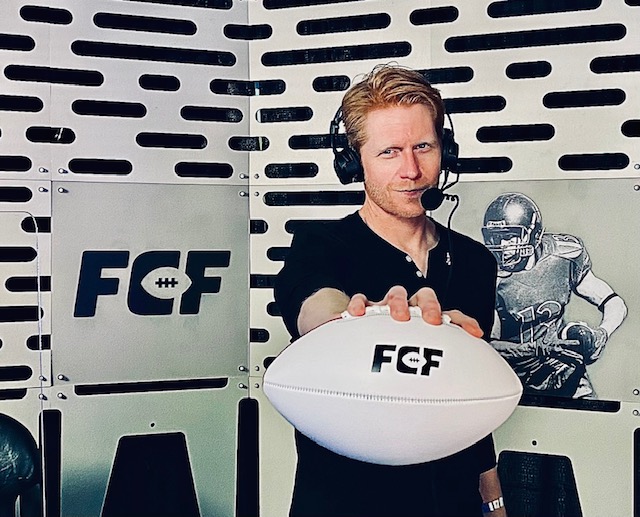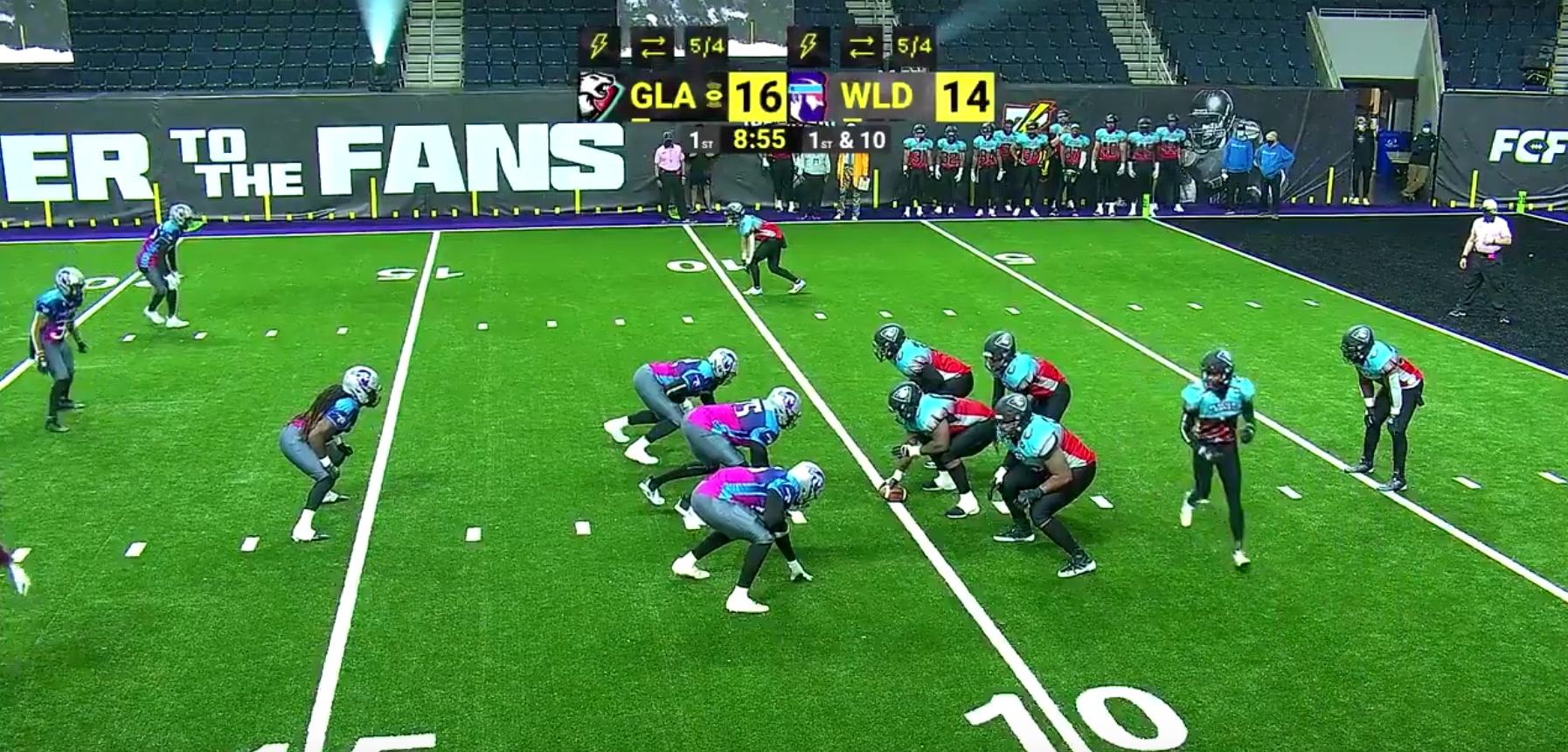SVG Sit-Down: Fan Controlled Football’s Patrick Dees on ‘Redefining Football for the Digital Age’
In young league, fans call plays; drone, miked players are among production elements
Story Highlights
Fan Controlled Football (FCF) wrapped up its inaugural six-week season last weekend with The People’s Championship. The league, which allows fans not only to call plays but also to redraft each team’s roster every week, features production elements that differentiate it from traditional NFL and college football coverage, including drones, HelmetCams, miked players, and 180-degree cameras on the sidelines.
Prior to the FCF finale, SVG sat down with league Co-Founder and Chief Gaming Officer Patrick Dees, who previously owned a stake in the Arena Football League’s Las Vegas Outlaws and the Indoor Football League’s Salt Lake Screaming Eagles (which essentially served as a proof-of-concept team for the FCF model). Dees discussed the league’s overall philosophy, how its broadcasts are differentiated from traditional football coverage, how the fan play-calling system works, the inspiration provided by EA’s Madden NFL videogame franchise, and what to expect in future seasons of the FCF.
CLICK HERE for SVG’s in-depth story on FCF productions.
Philosophically, what is FCF trying to accomplish in terms of the broadcast experience for fans? How does that experience differ from a traditional football broadcast?
How does it differentiate? I’d say pretty dramatically. Our goal is to fundamentally redefine football for the digital age. We wanted to take a step back and ask, “If you invented football now, what would it look like?” And holistically, not just from a rule-set perspective, what type of experience should it provide for the fan?
We decided on a few main pillars: the fans’ actions dictating what happens on and off the field, a broadcast that lived on Twitch and gave people a lean-forward experience, and a few key rules — a one-hour running clock, [eliminating] special teams, things like that.

FCF’s Patrick Dees: “We had a basic understanding of what we were looking for from a production standpoint, but it turned out to be more of a bespoke process.”
Originally, we were going to shoot at Caesars Entertainment Studios in Las Vegas because we thought it would be easier to get all these celebrity owners from L.A. to take a 42-minute flight. But then the pandemic happened, and we realized we could shoot anywhere, and Atlanta made the most sense.
In the beginning, we had a basic understanding of what we were looking for from a production standpoint, but it turned out to be more of a bespoke process because there are so many things that have to be communicated between the broadcast, the booth, the truck, and the backend of the system for the fan experience. It has been exciting.
What are some of the specific production elements FCF has implemented to make the broadcasts unique?
We’ve partnered with Crazy Legs Productions out of Atlanta, and they really got it from a vision perspective.
It starts with the drone cam, which gives you that Madden-esque angle. We’ve got three drones, with two up in the air at any given time: one trailing the play and one for that Madden-view cam. But we’ve actually used the drone less than we anticipated because the game is just so fast. We found mobile quarterbacks to be incredibly successful in the league, and, when they start scrambling and have long plays down the field, it’s difficult for the drone to chase them. So we’ve got to figure out how we can cover the game better with the drone.
As part of the viewing experience on Twitch, there’s a command center where [a fan] can watch all [camera angles] at once or do picture-in-picture. And, on each end of the field and each sideline, we have 180-degree cams that are not used in the broadcast. But a fan can hit that at any point in the command center, and it provides this incredibly cool view of the field. And you can bounce between them in real time during the play.
We also have ActionStreamer doing HelmetCam, and I’m really happy with how those have turned out. Football is such a violent and jittery sport that those cameras are sometimes unwatchable and can even make you sick. But these guys have done a really good job, and we’ve gotten some great shots. We’ve got several guys that are miked up.

Intended to redefine football. FCF 7-on-7 games are played on a 50-yard field, with no kickoffs, punts, or field goals.
We also have big bombastic entrances for player introductions, [giving] players a chance to showcase their personality. We encourage them to take the helmet off, and they can put whatever they want on the back of their jersey: Twitter handles, gamer tags, nicknames, anything they want.
We’ve also encouraged trash-talking within reason and celebrations whenever they score or have a big play. We’re incentivizing them by having fans vote on best celebration each week, and the player that has the best celebration gets a bonus. We’re going to continue to integrate that into the broadcast.
How does the fan play-calling system work?
Fans can actually decide what plays are called on Twitch and in the FCF app. When your team is on offense, you can choose Run or Pass, and you’re given a choice of four diagramed play options. Each fan puts in their vote and then is notified which play won the vote and can watch the play unfold on the field in real time. There also is this metric called FanIQ, which goes up if you’re really good at calling plays. The higher your FanIQ, the more weight your vote carries.
As I said, we want to redefine football for the digital age, but we also want to redefine the relationship between fan and league and fan and player. Our fans have proved incredibly valuable, especially when they see their name at the top of the fan leaderboard consistently for a team. They’re even recruiting other fans and bringing them in.
How have the gaming community and EA’s Madden NFL videogame franchise impacted your approach to FCF broadcasts?
We say our goal is for FCF to feel like “Madden in real life.” I learned the rules of football by playing Madden, not from watching the NFL, and I don’t think I’m alone in that. A large portion of this [younger] generation got into sports through videogames and fantasy. We are trying many new things with this league to appeal to that [demographic], but we still wanted to keep it accessible as a football game to [more-traditional] fans.
What about the in-venue experience for fans who are able to attend FCF games?
We always viewed this as more of a made-for-digital product because that digital audience is scalable and the in-venue audience is not. We know 99% of fans never get to a game anyway, so let’s focus almost entirely on the digital audience. We saw with the Screaming Eagles that a hundred different countries called plays for our teams, so we knew this could be global. The idea has always been that there would be just a very small number of fans [in-venue] for atmosphere only, not as a revenue generator. And so, when the pandemic hit, it did not present much of an issue for us. The in-arena experience is still very exciting but we’re really focused on what those people at home are viewing.
What shoulder programming are you creating outside the games themselves?
We built six studio shows around the league, and we’re going to continue to tweak them. We’ve also got the draft each week. To effectively understand these guys and how they’re performing each week, our fans want to know them off the field as well. So we’ve got a show called Deep Fade, where the players talk about not only football but also their lives outside football, how they got here, and what it’s like being a part of this unprecedented sports league, especially during the pandemic. We try to have as many vectors as possible so fans can get to know the players.
We also love big personalities here. When we first started [scouting players], we had a list of more than 600 guys that could have played in this league. We actually hired a casting agency and told them we needed to get down to 125 players. We wanted the biggest personalities and the best stories, so [the agency] did a grueling round of interviews and selected a great group. That was incredibly successful: every one of these guys has a great story to tell about how they’ve battled to get here, and some are even content creators themselves with big social-media and Twitch followings. I think, for a fan experience, it’s important to have those deep connections with players and teams.
Now that your first season is in the books, how do you see FCF evolving next season and beyond?
We look at it like software: this is version 1.0, and next season will be 2.0. This season, we’re shooting at Infinite Energy Arena outside of Atlanta. That’s going to change, although we’ll most likely stay in Atlanta. For version 3.0 on, we are looking to have home cities. Imagine teams in Vegas, New York, and Dallas and all the shoulder content around the league reflects that team’s local culture: the Texas shows are going to be diametrically different from shows we shoot in New York.
Think about it like the Real Housewives model, where there are similar archetypes but everything around each property is different. Fans are going to help determine that. We have relationships in a few different markets, and fans are going to choose where we go each season. So we’re really excited about next season and beyond.
